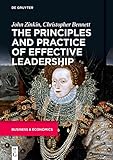The Principles and Practice of Effective Leadership / John Zinkin, Christopher Bennett.
Material type: TextPublisher: Berlin ; Boston : De Gruyter, [2021]Copyright date: ©2021Description: 1 online resource (XX, 346 p.)Content type:
TextPublisher: Berlin ; Boston : De Gruyter, [2021]Copyright date: ©2021Description: 1 online resource (XX, 346 p.)Content type: - 9783110707809
- 9783110708066
- 9783110707878
- 658.4092 23
- HD57.7 .Z546 2021
- HD57.7
- online - DeGruyter
- Issued also in print.
| Item type | Current library | Call number | URL | Status | Notes | Barcode | |
|---|---|---|---|---|---|---|---|
 eBook
eBook
|
Biblioteca "Angelicum" Pont. Univ. S.Tommaso d'Aquino Nuvola online | online - DeGruyter (Browse shelf(Opens below)) | Online access | Not for loan (Accesso limitato) | Accesso per gli utenti autorizzati / Access for authorized users | (dgr)9783110707878 |
Frontmatter -- Advance Praise for The Principles and Practice of Effective Leadership -- Acknowledgments -- Contents -- Introduction -- Part 1: Lessons from History -- Introduction -- Chapter 1 Leadership is Morally Neutral -- Chapter 2 Elizabeth Tudor -- Chapter 3 Napoleon Bonaparte -- Chapter 4 Mustafa Kemal Atatürk -- Chapter 5 Lessons Learned -- Part 2: Leadership is Managerial -- Introduction -- Chapter 6 Managerial Leadership -- Part 3: “Leadership Techniques” -- Introduction -- Chapter 7 Dealing with Volatility, Uncertainty, Complexity, and Ambiguity -- Chapter 8 Reconciling VUCA with the Need for Simplicity -- Chapter 9 Combining two Leadership Models with Managerial Skills -- Chapter 10 Communicating Effectively -- Chapter 11 Ethical and Effective Decision-Making -- List of Figures -- List of Tables -- About the Authors -- Index
restricted access online access with authorization star
http://purl.org/coar/access_right/c_16ec
This thought-provoking and timely book asserts that the dichotomy between leaders and managers described in much business literature fails to recognize how the two roles overlap. The book discusses techniques for senior executives based on history and neuroscience to enhance their "managerial leadership" in different environments. The ethical dilemmas of directors and executives are explored, with lessons from both leadership failures and successes. The Principles and Practice of Effective Leadership redefines "leadership" as a morally neutral activity, reflecting the impact of strategic, cultural and operational contexts on a leader’s effectiveness. The authors suggest there are universal but morally neutral techniques for effective leadership that depend on the context in which they are practiced. In Part 1, the careers and personalities of historical figures including Elizabeth Tudor, Napoleon, and Atatürk are examined. Part 2 deliberates on why leadership cannot be separated from effective management and concludes that leadership is managerial, and best encapsulated in the concept of "wayfinding." In Part 3, the authors discuss the techniques "wayfinders" can learn to be both effective and ethical, using a simple and practical framework. This insightful book is essential reading for professionals, coaches, consultants, and academics interested in techniques and ethics of leadership and executive education.
Issued also in print.
Mode of access: Internet via World Wide Web.
In English.
Description based on online resource; title from PDF title page (publisher's Web site, viewed 01. Dez 2022)


